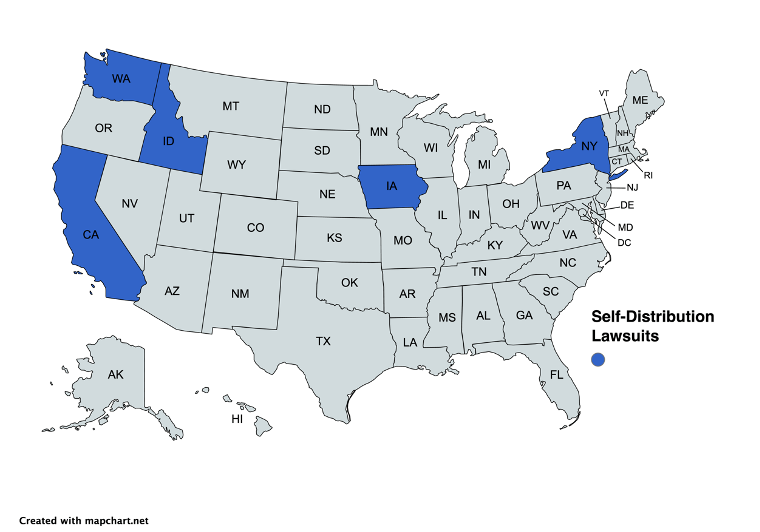
The second half of my talk at this month’s National Association of Wine Retailer’s Summit focused on an exciting new development in the fight to expand the alcohol marketplace. Although cases challenging direct shipping restrictions have been going on for more than two decades, in the last year industry members have begun fighting a new foe⏤ discriminatory self-distribution laws.
A growing number of states permit wine, beer, and/or spirits producers to self-distribute, which means to sell directly to retailers without having to use a distributor. In most cases, however, states limit self-distribution to in-state producers, usually smaller craft producers. Permissions vary between wine, beer, and spirits. Legislatures either don’t know or don’t care that laws discriminating against out-of-state businesses are invalid.
Self-distribution provides producers broader access to the retail marketplace at higher margins. It also allows retailers to diversify offerings and obtain otherwise inaccessible products, often at a lower price. If the new lawsuits make self-distribution more widely available, they will create significant new opportunities for affected producers, retailers, and consumers.
Until the last year, only three federal courts had considered Commerce Clause challenges to self-distribution laws:
o In 2005, a Washington district court relied on Granholm to invalidate the state’s discriminatory wine and beer self-distribution statute. (Costco. v. Hoen) The Washington Legislature later extended the direct sale privilege to out-of-state producers.
o In 2010, the Third Circuit followed Granholm in striking down a discriminatory self-distribution law for wineries, remanding the case to the district court to determine a remedy. (Freeman v. Corzine)
o Also in 2010, an Illinois district court followed Granholm in striking down a discriminatory self-distribution law⏤ withdrawing the privilege from in-state producers but staying enforcement of the decision for six months to give the Illinois General Assembly time to act. (Anheuser-Busch, Inc. v. Schnorf)
These cases are high risk and high reward because courts can either expand or contract the marketplace depending on how they resolve the dispute. The real battle is in state legislatures, which often enact new laws in response to judicial rulings.
In the last year, industry members filed five (5) new cases challenging discriminatory self-distribution laws, all of which are in the early stages of litigation.
Here is the latest on each of the five cases:
#1. Washington: Shady Knoll Orchards & Distillery v. Postman
In June 2023, a New York distillery filed a complaint challenging a Washington law allowing only in-state distillers to ship directly to retailers and consumers. On October 24, 2023, the District Court declined to dismiss the case, noting there was a split of authority among Circuit Courts on discriminatory alcohol laws. The District Court ruled:
“Defendant invites the Court to dismiss the case on the basis that, since Granholm and Tennessee Wine were decided, other courts of appeals—namely, the Fourth, Sixth, and Eighth Circuits—have apparently allowed the creation of three-tier systems ‘with limited exceptions … in which [distributors] can play multiple roles,’ including state physical presence for direct sales. However, Plaintiff retorts that courts in the First, Seventh, and Eleventh Circuits have reached the opposite conclusions. Plaintiff also represents that the Ninth Circuit has not squarely confronted these issues. Even accepting Defendant’s claims that some post-Granholm authority exists which would support a discriminatory in-state physical presence requirement, the existence of a circuit split compels the Court to stay its hand. At this stage, Defendant has not shown that Plaintiff’s allegations, if proven true, fail to state a plausible claim to relief.”
Since then, the parties have been conducting discovery and preparing motions for summary judgment.
Circuit court splits make it harder for courts to apply the law. They lead to inconsistent and unfair results for similarly situated litigants, and they increase uncertainty for all market participants.
#2. Iowa: Buckel Wine v. Mosiman
In July 2023, two Oregon and Colorado wineries challenged an Iowa law allowing only in-state wineries to sell directly to retailers. The parties are conducting discovery.
#3. Idaho: Roberts v. Gripton
In August 2023, two Washington breweries filed a complaint against an Idaho law allowing in-state breweries only to sell directly to retailers. The parties are finishing discovery. Motions for summary judgment are due by September 20, 2024.
#4. New York: Alba Vineyards v. New York State Liquor
In September 2023, a New Jersey winery and a New York retailer filed a complaint against a New York law allowing only in-state wineries to sell directly to retailers. The District Court scheduled trial for July 16, 2024, which is unusual because cases challenging discriminatory alcohol laws are usually resolved on motions for summary judgment.
#5. California: Dwinnell v McCullough
In November 2023, a Washington winery challenged a California law allowing only in-state wine producers to ship directly to California retailers. The parties are conducting discovery.
Thank you to the National Association of Wine Retailers (NAWR) and its members for supporting this exciting second front in the fight against restrictive alcohol laws!
This informational piece, which may be considered advertising under the ethical rules of certain jurisdictions, is provided on the understanding that it does not constitute the rendering of legal advice and does not form an attorney-client relationship. You can unsubscribe from future messages by replying “unsubscribe” to this message.




